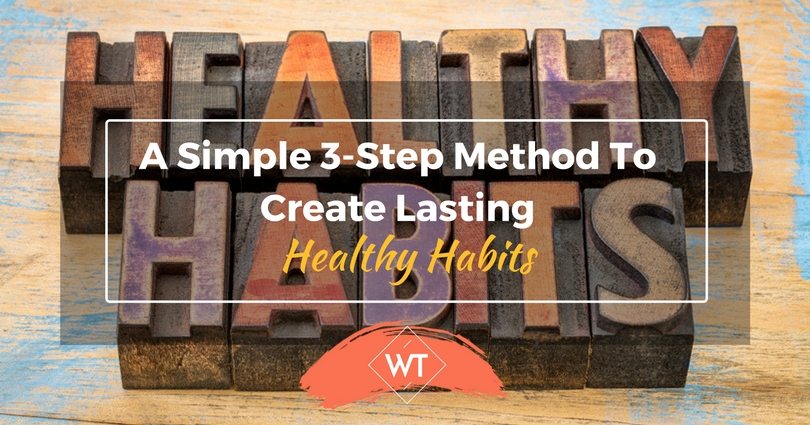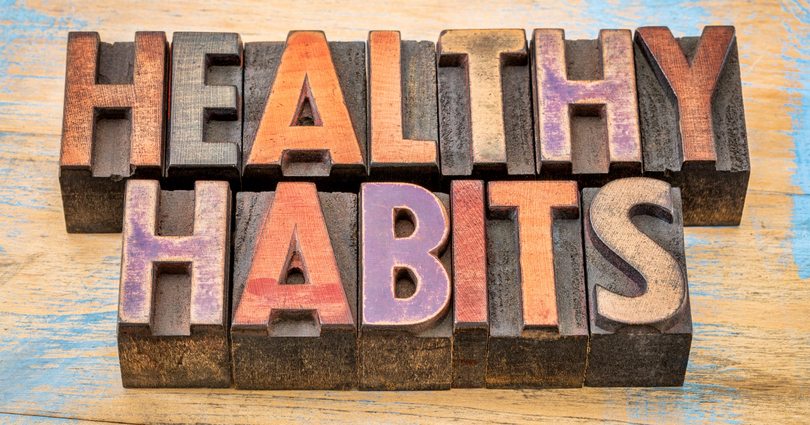A Simple 3-Step Method To Create Lasting Healthy Habits

This next Healthy Habits trick comes to us from none other than Benjamin Franklin. One thing Ben knew for sure was that change takes time. He also knew that healthy habits weren’t always the easiest things to implement. So you need two things, then: time and consistency.
In other words:
If you are persistent, you will get it. If you are consistent, you will keep it. (Tweet this)
With that in mind, I bring you, the secret change method of Benjamin Franklin.
Step 1: Healthy Habits with the magic of 13 x 4
We start by knowing that there are 52 weeks in a year. We then make a list of 13 healthy habits we either want to improve or create. So for example we choose a few things from the fitness and exercise category, maybe a few from our diet category, something from work and something from our passion or hobby. We can even toss in a healthy habit involving our family as well for good measure. Once we have our list, we move on to the next step. Scheduling.
Our goal is to focus on only one healthy habit each week. If you do this, then at the end of a year you will have focused on each healthy habit for an entire month! And that’s why this is called magic (or math)! It gets you one extra healthy habit to fix each year almost by magic (because in the conventional system, if you worked on only one habit each month, you would only have time for 12 healthy habits because there are only 12 months in a year. That equals only 12 habits. This way gets you 13 healthy habits! This guy was a certified genius!).
Step 2: If you know your why, you’ll never lose your way
According to Dr. Janice Presser, “Never try to ingrain a habit in yourself that you don’t truly want. If you aren’t willing to give something up FOREVER that gets in the way of that habit, you don’t want it sufficiently. That’s why most people who lose weight regain it.”
To implement this, we really have to understand WHY we want a certain thing. Probably, my biggest bad habit is sugar. I don’t do drugs or any ridiculous things like that. I don’t overeat. I don’t smoke. I don’t gamble. I read books constantly. I don’t watch TV. But sugar . . . Well, I just never found a reason to dump it.
Yes, being a nutritionist I have read many books and studies on the subject and they all say to get rid of it. Gandhi said the same thing. Still, though . . . it ends up in my coffee every day (as you roll your eyes about my coffee habit). Fair enough, I maybe have 2 bad habits.
My point is that, as Dr. Presser has said, if you aren’t willing to give it up forever, you don’t want it. She’s right. And so I still use it. I simply don’t have a strong enough “why.” Because of this, I will always lose my “way.”
Step 3: Pearson’s Law for the win
“That which is measured, improves.” Or, said differently, “When performance is measured, performance improves.” If you want your new healthy habit to stick, you have to track it. There are several ways to do this.
You can use a journal or a diary. There is a difference in the 2. Think of a food journal for tracking what you eat (for example if your goal is to lose weight), vs a diary (which is book where you talk about your progress with things that are less statistical in nature) for more experiential things.
You can also use an accountability partner. People are great because they can also give us motivation or even partner with us to implement healthy habits of their own. They can also see things we can’t, in case we have a blind spot. For example, adding sugar to our coffee!
Which ever method you choose, these 3 steps will help you create lasting, healthy habits faster and more productively (meaning less mistakes along the way).
I wish you good luck and very healthy habits!









Leave a Reply